|
HARPER’S WEEKLY New York, Saturday, February 19, 1898 Vol. XLII.—No. 2148 Pages 172-174 AFTER two months' stay on the island of Cuba, and after what I have seen and heard, I am able to state positively that Spain has lost forever the control of the Pearl of the Antilles. Before going to the island I had made up my mind that I would have to go through great hardships and privations, but, once there, I found myself happily disappointed. I found the cavalry well mounted, the infantry well armed and well trained; the only thing that they were in need of was clothes, and fortunately, owing to the mildness of the climate, that was not so great an evil after all. I travelled for twenty-one days in going to the seat of the Cuban government, and not once were we molested by the Spaniards, nor were we even obliged to change our route on account of the presence of the enemy, which I found conspicuous by its absence. Every morning we enjoyed the luxury of plenty of fresh milk, and our food was always plentiful and of the best quality, consisting of beef, pork, mutton, cassava bread, sweet-potatoes, plantains, cheese, honey, coffee, etc. To give my readers an idea of what limited control the Spaniards have of the island, I can state that we camped at a ranch about ten miles front the capital of the province of Camaguey—Puerto Principe, a city garrisoned with 70,000 Spanish soldiers—without feeling obliged to set a guard at night. In this province I saw a great number of cattle, the finest and fattest cattle I have ever seen; and when one considers that the Spaniards are obliged to import beef cattle not only in Havana, but also in this province, or rather in their only two strongholds, Nuevitas and Puerto Principe, one can easily see t hat their power is very weak. The Cuban government I found to be working with just the same routine as any well-recognized government. Major-General Bartolomé Masó, the President of the Cuban republic, impressed me as being a very conscientious, energetic, and intelligent man, and, above all things, a great patriot, and one who has the reputation of' being one of the most honest men on the island. He was born in Manzanillo in 1834, and took part in the insurrection of 1868. On the 24th of February, 1895, he left Manzanillo, and has been in the field ever since. He was elected Vice-President of the Cuban republic on September IS, 1895, and elected President October 29, 1897 The Vice President, Mendez Capote, is also an exceedingly bright and clever man, and is a great diplomat. He has the rank of Brigadier-General, and was born in Cardenas, in the province of Matanzas. He holds the degrees of LL.D. and Ph.D. from the University of Havana, and is secretary of the Spanish-American Light and Power Company, Consolidated, and was counsel for the Railroads of Havana. The members of the cabinet are also very competent and intelligent men, belonging to some of the best. families of Cuba. The Secretary of War, Brigadier Jose B. Aleman, is a native of Santa Clara, and is thirty-four years old. He is not only a planter, but the editor and owner of La Defensa, a Liberal newspaper published in Santa Clara, and has served as alderman of the Santa Clara Municipal Council. The Secretary of the Treasury, Colonel Ernesto Fons Sterling, was born in Havana. He is twenty-eight years old, a property-owner, and belongs to one of the best families on the island. The Secretary of Foreign Affairs, Colonel Andres Moreno de la Torre, was born in Cardenas, in the province of Matanzas. lie is thirty-eight years old, and holds the degree of D. He is the owner of a sugar-plantation, and is a well-known lawyer of Havana and Cardenas. The Secretary of the Interior, Lieutenant-Colonel Manuel Ramon Silva, was born in Puerto Principe. He is thirty years old, and holds the degree of Doctor of Medicine, and is a well-known physician in Puerto Principe. To give a practical illustration of the power of the Cuban government, I can state that while I was there a delegation of sugar-planters came up to the government to see if by paying a heavy contribution they would be allowed to grind their crop. Although the money which they offered would have come very handy to the Cuban. treasury, yet, after a long deliberation, the President decided that it would be detrimental to the Cuban cause to allow the planters to grind their cane—first, because it would necessitate the employment of many people who, if in a starving condition, would swell the insurgent ranks, and second, because if the grinding were permitted the Spaniards would give it out as a proof of pacification. The President, therefore, felt himself justified in refusing their petition, and they left us with the knowledge and understanding that if they should attempt to grind, their plantations would be destroyed by the insurgent forces. Another thing that impressed me was the good order that prevailed, and the severe discipline in the insurgent ranks. The insurgents are well supplied with workshops where arms are repaired, and where shoes, saddles, and other supplies are manufactured for the army. There are good schools in Cuba, and a very good postal service, using the well-known Cuban stamps. The pacificos who are in the fields supply the food for the army, and are under military supervision. Their huts are often used as hospitals. I interviewed men of all ranks from generals to common soldiers, regarding the acceptance of autonomy. They all have the same idea, and they all say the same thing, that even if autonomy should be granted to them on as liberal terms as that of Canada or of Australia. they would not accept it. Cubans consider the offer of autonomy a sham, a mere device on the part of Spain to lure the insurgents into laying down their arms. They have now fought for nearly three years, and they will continue to fight, no matter how long, to gain the end which Marti and Maceo indicated to them, and they will not lay down their arms until the flag of freedom shall float from Cape Maisi to Cape San Antonio. —F. D. PAGLIUCHI. THE CAPITAL OF THE CUBAN GOVERNMENT. FROM PHOTOGRAPHS BY F. D. PAGLIUCHI, SPECIAL CORRESPONDENT OF "HARPER'S WEEKLY." 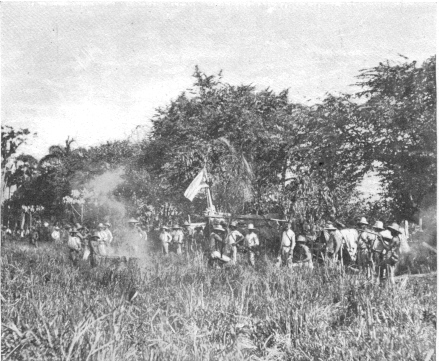 REGIMENT PANCHITO GOMEZ, FOR THE DEFENCE OF THE CUBAN GOVERNMENT. 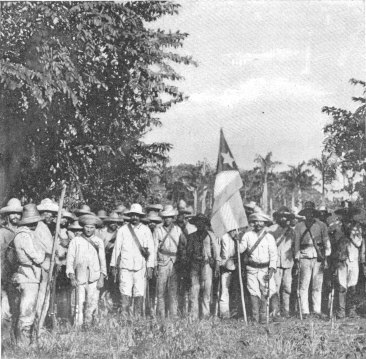 REGIMENT AGRAMONTE, FOR THE DEFENCE OF THE CUBAN GOVERNMENT. 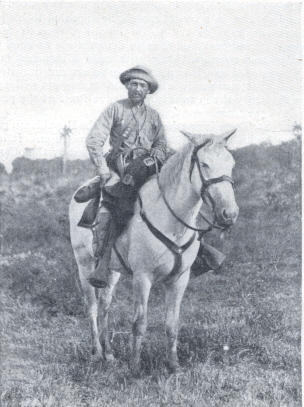 CAPTAIN PARDO, IN CHARGE OF CORRESPONDENCE, GOING THROUGH THE TROCHA. 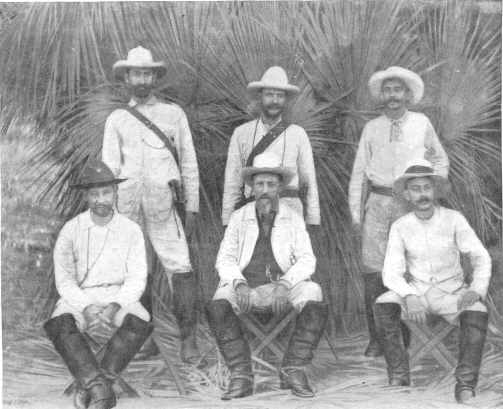
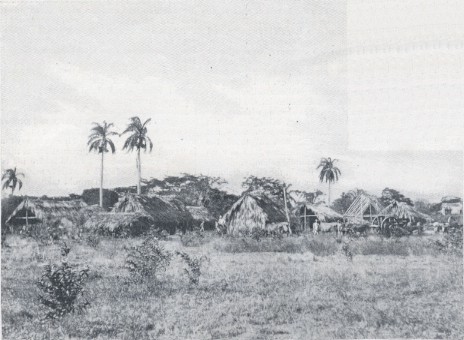 LA ESPERANZA, SEAT OF THE CUBAN GOVERNMENT ABOUT EIGHTEEN MILES FROM PUERTO PRINCIPE. 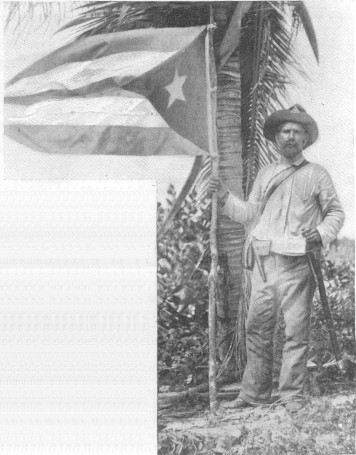 COLOR-BEARER. 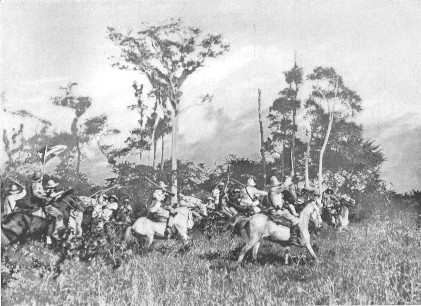 CUBAN CAVALRY CHARGING SPANISH GUERILLAS ON THE OUTSKIRTS OF PUERTO PRINCIPE. 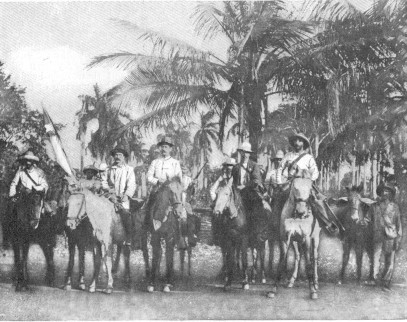 BRIGADIER-GENERAL JUAQUIN CASTILLO AND HIS STAFF. 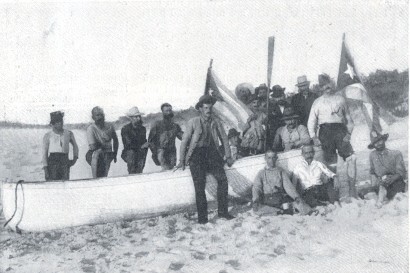 THE LANDING OF GENERAL CASTILLO'S EXPEDITION IN CUBA. 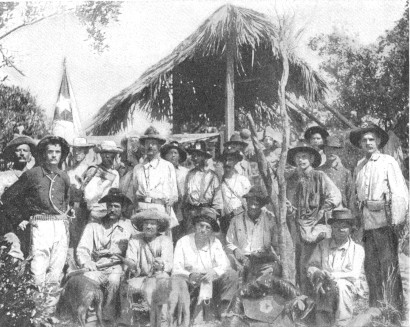 GENERAL CASTILLO'S EXPEDITION ASHORE. 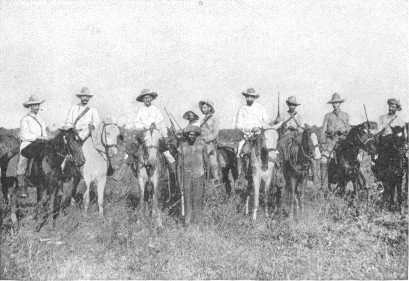 GENERAL LACRET MERLOT AND HIS STAFF.
|